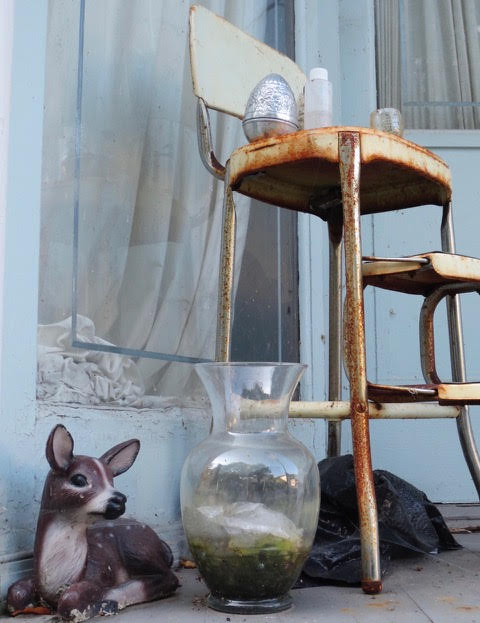|
Flourish and Decay A fawn is to a doe as a minute to an hour, each an insinuation of a maturity hard won. The albumen of an egg may be dispersed in water and the future foretold according to the nascent shapes. Oomancy, divination by eggs, was once widespread. A white-tailed deer is fashioned to prevail, defying the maxim sink or swim. Endowed with hollow air-filled hair shafts, the even-toed ungulate floats without resistance, impervious to drowning. A doe at daybreak surrenders her fawn to a hidden bed, retrieving her secret cache at dusk. The aloneness of the fawn cracked open by daylight is as the loneliness of a relic expelled from a silver egg. Speculation: Within the vault of the precious egg may reside the baby teeth of Jesus, the Virgin’s milk evaporated, velvet from a buck’s antlers, the tatters from Mary’s veil, the hollow hair of a deer. Fact: Antlers are the fastest-growing living tissue on earth. Fact: The fawn, at birth, has four lower incisors. Certainty: Fawns arise and crest in spring and high summer, the season for bucks of antler development and growth. The fading of the spots runs apace with the shedding of the velvet enfolding the propulsive branches, tines, beams, and points. The curve of a fawn’s haunches, the slope of an egg, the globe of a vase yearning for the circularity of a crystal ball, the orb of time, the hungry capacity of a measuring cup—all are wanting. Having eyes on the sides of the head gives deer a wide field of vision, so wide that they are even able to see behind them when they are facing straight ahead. The hours to a fawn are as the ounces to a measuring cup, the seconds in an hourglass, the increments of fluid in a vase, the snippets that lend a reliquary its purpose, the promise of an egg. The fawn will sup on the algae. The rust will consume the chair. The egg has swallowed the relic. The liquid in the measuring cup has congealed. The future, ever restless, plays tag with the algae-tinged vase, once a sanctuary for long-stemmed roses. “Ruminant,” a word worthy of deer, originates in the Latin ruminatus: “to turn over in the mind,” or, more prosaically, “to chew the cud.” Sharon Kirsch Sharon Kirsch is the award-winning author of two books of creative nonfiction: The Smallest Objective, a mother-daughter memoir, and What Species of Creatures, a work inspired by historical writings about birds and “beasts.” She has lived in the US and the UK and is currently based in Toronto, Canada, where she volunteers as a caretaker for feral cats. You can visit her at https://sharonkirsch.com.
0 Comments
Your comment will be posted after it is approved.
Leave a Reply. |
The Ekphrastic Review
COOKIES/PRIVACY
This site uses cookies to deliver your best navigation experience this time and next. Continuing here means you consent to cookies. Thank you. Join us on Facebook:
July 2024
|




